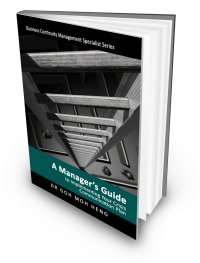Disaster
1. A Disaster is a sudden unplanned event that causes great damage or serious loss to an organization.


| ||||||||||||||||||||||||||||||||||||

2. Event that causes great damage or loss.
(Source: ISO 22399:2007 – Societal Security - Guideline for Incident Preparedness and Operational Continuity Management) - clause 3.4
{{#ev:youtube|P3n6PEKdUls|250}}
3. A sudden, unplanned calamitous event, usually causing great damage or loss, making an organization unable to provide critical business functions for some predetermined minimum period of time.
(Source: SS540 Singapore Standard on Business Continuity Management - SS 540:2008)
(Source: Malaysia BCM Standard MS1970:2007)
4. A sudden, unplanned calamitous event causing great damage or loss. 1) Any event that creates an inability on an organization's part to provide critical business functions for some predetermined period of time. 2) In the business environment, any event that creates an inability on an organization’s part to provide the critical business functions for some predetermined period of time. 3) The period when company management decides to divert from normal production responses and exercises its disaster recovery plan. Typically signifies the beginning of a move from a primary to an alternate location. SIMILAR TERMS: Business Interruption; Outage; Catastrophe.
(Source: Disaster Recovery Institute International / Disaster Recovery Journal - DRII/DRJ)
{{#ev:youtube|TnNLidh2BN4|250}}
5. An unanticipated incident or event, including natural catastrophes, technological accidents, or human-caused events, causing widespread destruction, loss, or distress to an organization that may result in significant property damage, multiple injuries, or deaths.
(Source: ASIS International - ASIS International)
6. An ongoing process to prevent,mitigate,prepare for,respond to,and recover from an incident that threatens life,property,operations or the environment.
(Source: NFPA 1600 Standard on Disaster/Emergency Management and Business Continuity Programs, NFPA 1600:2007)
7. If an incident overwhelms management's capabilities to cope,control will begin to be lost and the event becomes regarded as a disaster.Disasters are usually characterized by external agencies taking over management of the event.
(Source: Australia. A Practitioner's Guide to Business Continuity Management HB292 - 2006 )
